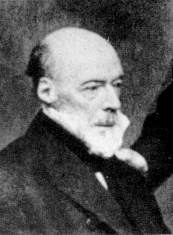| Profile | Major Works | Resources |
Colonel Robert Torrens, 1780-1864

Prominent (but critical) Classical economist.
Irish-born Robert Torrens joined the Royal Marines as an ensign in 1796. Torrens was on active duty in England until 1810, when he was placed in command of a marine battalion on the recently-conquered Anholt island in the Kattegat. In 1811, Torrens led the celebrated repulsion of a more numerous Danish invasion force on Anholt island, and was wounded in the process. He retired as lieutenant colonel in Woolwich on half-pay in 1823 (briefly restored to full pay in 1830-34, whereafter he sold his commission).
The Anholt action aside, Torrens military duties could not have been too strenuous, for he found himself involved in numerous other activities. While still in active service, he published his first economic pamphlet, The Economist Refuted (1808), a riposte to William Spence. Around this time, Torrens devoured the works of Adam Smith and would take on several of the latter's characteristic theories, notably the real bills doctrine. In 1812, he published his Essay on Money and Paper Currency, setting himself as the leader of the Anti-Bullionists during the Bullionist Debate of the 1810s.
In February 1815, while the Corn Laws debate was at its height, Robert
Torrens published his Essay on the External Corn Trade (1815). The
impetus of the piece was to respond to Malthus's
support of the restrictions. Its preface is mean-spirited in tone:"Mr
Malthus scarcely ever embraced a principle, which he did not subsequently
abandon." (p.ix), Torrens famously noted, before proceeding to accuse him of
plagiarizing his population doctrine from Robert
Wallace. In the Essay, Torrens lays out his what is in effect
his independent discovery of the Ricardian
differential theory of rent - although not as complete as the simultaneous
pieces by Ricardo's or West's
(Torrens noticeable misses out on the intensive margin).
[It is frequently alleged that Torrens (1815) also articulated (before
Ricardo!) the theory of "comparative advantage" in international
trade. The allegation rests on a single passage (or rather, single phrase, "even
though they should be superior", on
p.264), but it otherwise seems he is working through the bulk of the essay
with absolute advantage. In later editions of the Essay, Torrens
would congratulate himself for this discovery (e.g.1829:
p.vii), but later acknowledge himself indebted to Ricardo for it (e.g. 1844:
p. 332). We ought also to note that, policy-wise, Torrens was not a
believer in unilateral free trade; he saw the expediency of reciprocal tariffs.]
Torrens's activities put him in personal contact with David
Ricardo, and the two men are known to have visited each other and dined
together.
Around 1818, Torrens acquired The Traveller, a sleepy trade journal for commercial travellers, which Torrens would quickly turn into a leading and influential newspaper. General editorship was placed in the hands of the Benthamite Walter Coulson, but Torrens retained the political economy section for himself. [the young J.S. Mill's first appearance in print was in The Traveller in December 1922, a response to Torrens on the meaning of "exchangeable value"]. In 1823, Torrens acquired The Globe and fused the papers under the latter title. Over the next few years, Torrens went on to purchase five more papers: The Statesman, The True Briton, The Nation, The Evening Chronicle, and The Argus. Under Coulson's successor, Gibbons Merle, the Globe became more stridently Whig and a mouthpiece for the reformist liberal faction of Lord John Russell. It was only after Torrens death in the 1860s that the Globe gradually abandoned its strident liberalism and became a bastion of cautious conservatism.
Although generally regarded as a member of the Ricardian school, Torrens remained a consistent critic of the "labor theory of value" (e.g. 1818), and later, after Senior's critique of 1829, recanted the Malthusian population doctrine Torrens joined the side of the Currency School in the Banking-Currency School Debate of the 1840s.
Torrens served on the colonization committee of South Australia. The Torrens river in Australia is named after him.
HET
|
|
Resources on Robert Torrens
|
All rights reserved, Gonçalo L. Fonseca
